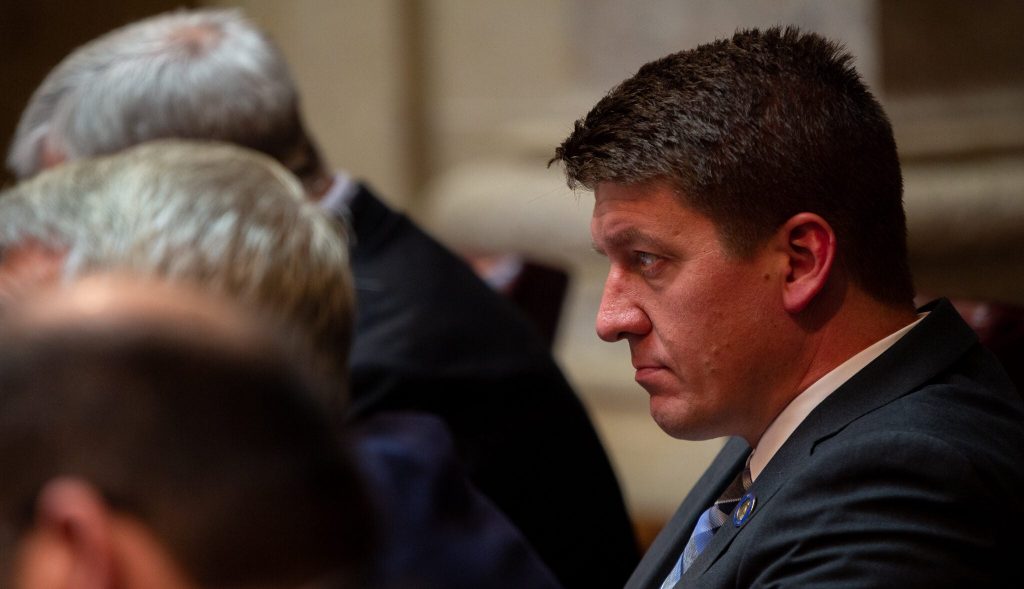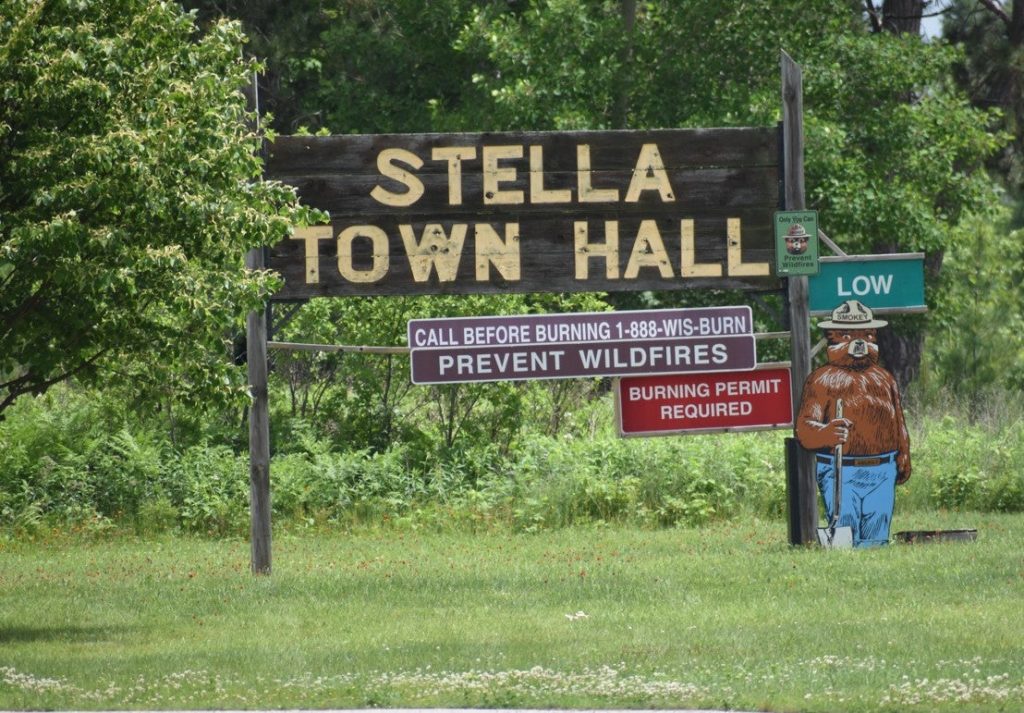Wisconsin Lawmakers, DNR Clash Over PFAS Protections in GOP Bills
GOP proposal would shield those who spread PFAS in biosolids with state approval.

The kitchen sink at Margie Walker and Jim Boisen’s home in French Island, Wisconsin. Angela Major/WPR
Republican lawmakers say their latest bills to address PFAS would offer critical financial aid and protect innocent landowners from footing the bill for contamination they didn’t cause.
They’re at odds with state regulators who argue the proposals would still let polluters off the hook.
At a Tuesday public hearing on the bills at the state Senate’s Natural Resources committee, Wimberger and Mursau said their goal is to protect innocent individuals and businesses, not to let polluters escape responsibility for cleaning up the chemicals.
“It’s imperative we don’t sweep up those who are not responsible and treat them as though they are,” Wimberger said. “The bill aims to prevent a dilemma ordinary people face to choose between their health and financial ruin.”
PFAS, short for per- and polyfluoroalkyl substances, are a class of thousands of synthetic chemicals used in cookware, food wrappers and firefighting foam. They don’t break down easily in the environment. High exposure to the chemicals has been linked to kidney and testicular cancers, fertility issues and other serious health problems.

Wisconsin state Sen. Eric Wimberger, R-Green Bay, is photographed during a state Senate session on June 28, 2023, in the Wisconsin State Capitol building in Madison, Wis. Drake White-Bergey/Wisconsin Watch
Gov. Tony Evers, a Democrat, and GOP lawmakers have been gridlocked over addressing PFAS. They agreed to set aside $125 million to address the chemicals under the last two-year state budget, but the funds haven’t been released. Last year, Evers vetoed a similar GOP bill over fears it would let polluters off the hook and limit the authority of the state Department of Natural Resources.
The DNR agrees with exemptions that would protect farmers and residents, which Evers proposed in his budget earlier this year. Even so, Sieger said exemptions won’t provide the necessary resources to provide them with safe drinking water. She added that the Republican-controlled Legislature should make clear that the bills don’t absolve industry of liability.
“Let’s make sure the spills law stays in effect for industrial manufacturing and commercial property owners that created or controlled PFAS, who knowingly spread PFAS-containing biosolids, causing off-site private wells to be contaminated with PFAS,” Sieger said.
Last week, the DNR named paper companies responsible for widespread PFAS contamination in the town of Stella, including the Rhinelander mill’s owner Ahlstrom Rhinelander LLC. If the proposed legislation were law, said Kara O’Connor, director of development for Midwest Environmental Advocates, the company could not be held responsible since it spread PFAS-laden sludge under a state-approved permit.
“If these bills become law, farmers and landowners in the town of Stella will be left with no responsible party to pay for cleanup,” O’Connor said.

The town of Stella in Oneida County has been facing PFAS contamination of private wells and the Moen Lake Chain. A sign for the town hall is pictured here on June 21, 2025. Danielle Kaeding/WPR
Environmental and conservation groups oppose the bills, including Midwest Environmental Advocates, Wisconsin’s Green Fire and Wisconsin Conservation Voters. Local government and farm groups support the legislation, including the Wisconsin Farm Bureau Federation, Wisconsin Towns Association and League of Wisconsin Municipalities.
Farm advocates say the bills are critical to ensure individuals and businesses acting in good faith aren’t unfairly penalized.
“The discovery of PFAS compounds in some biosolids has created fear and uncertainty for farmers who did nothing wrong under the current law,” said Jason Mugnaini, executive director of government relations for the Wisconsin Farm Bureau Federation.
Evan Miller, the group’s government affairs specialist, said the city of Prescott’s roughly 4,500 residents are facing $13 million in costs to treat municipal wells for PFAS contamination. Without access to grants through legislation, ratepayers would likely face higher costs.
Wisconsin Manufacturers and Commerce, the state’s largest business group, argues the bill could provide additional support to farmers and businesses. A truly comprehensive bill would provide immunity to PFAS manufacturers for how their products were used, said Adam Jordahl, WMC’s director of environmental and energy policy.
“We are not suggesting that any manufacturer or company that actually discharges PFAS to the environment should be immune from liability,” Jordahl said. “We simply believe that fundamental fairness dictates that a manufacturer should not be held liable for how someone used their product after it was purchased.”
Dan Kapanke, chairman for the town of Campbell, said he hoped the bills would provide relief for his community on French Island and others facing PFAS contamination. The Campbell town board backed the legislation last week.
Even so, Lee Donahue, the lone town supervisor who opposed the bill, said the town would be ineligible for aid because legislation ties aid to PFAS standards. Limits are currently lacking for the chemicals in groundwater, which supplies drinking water to private wells in the town.
In the current state budget, Evers and lawmakers approved more than $732 million in borrowing to help communities fund water and wastewater upgrades under state loan programs. The DNR has said 96 public water systems would be required to address PFAS levels exceeding federal standards. Water utilities and businesses face at least $26.6 million to implement federal limits in the first year.
Wisconsin lawmakers, regulators clash over PFAS protections in GOP bills was originally published by Wisconsin Public Radio.
If you think stories like this are important, become a member of Urban Milwaukee and help support real, independent journalism. Plus you get some cool added benefits.
More about the PFAS Problem
- PFAS Levels in Great Lakes Fish Are Dropping - Danielle Kaeding - Feb 6th, 2026
- Gov. Evers and GOP Lawmakers Near a Deal on PFAS Pollution - Danielle Kaeding - Jan 22nd, 2026
- Gov. Evers Optimistic About Reaching Final Deal With Republican Lawmakers to Secure Release of $125 Million in Long-Awaited Pfas Investments - Gov. Tony Evers - Jan 21st, 2026
- Bipartisan Push to Tell Counties Faster When Water Tests Fail - Henry Redman - Dec 19th, 2025
- MKE County: County Seeks to Sue PFAS Producers, Oil Companies - Graham Kilmer - Dec 10th, 2025
- Wisconsin Reviewing EPA-Approved Pesticides For PFAS - Danielle Kaeding - Dec 9th, 2025
- State Nears Settlement with Johnson Controls/Tyco Over PFAS Spills - Danielle Kaeding - Dec 4th, 2025
- Senate Bill Promotes Soybean-Based Firefighting Foam to Replace PFAS - Danielle Kaeding - Dec 2nd, 2025
- Test Results Show High PFAS Levels in Wisconsin’s Landfill Runoff - Danielle Kaeding - Dec 2nd, 2025
- Wisconsin Communities Get $282 Million for Drinking Water Projects - Danielle Kaeding - Nov 19th, 2025
Read more about PFAS Problem here






















Two northeastern Wisconsin Republicans carrying water (sorry; couldn’t help it) for the polluters at Tyco. Shameless toadies. Do whatever WMC tells em to do.